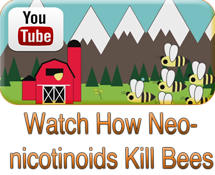17 July 2013. Fipronil: European ban on bee-killing insecticides goes on
PAN Europe welcomes the vote of the Standing Committee on Phytopharmaceuticals. Yesterday, Member States (MS) have voted in favour of the European Commission’s proposal to ban fipronil, an insecticide whose toxicity is comparable to neonicotinoids’ one.
Last May, the European Food Safety Authority (EFSA) has concluded that fipronil use induces high risk to bees and that many data gaps do not permit to ensure bee’s safety. Fipronil is a neurotoxic insecticide highly toxic to bees. It can either induce bee death or sublethal effects such as disorientation or learning impairment. It is authorised in several MS as a seed treatment, especially for maize and sunflower uses. Seeds are coated with the insecticide which is absorbed by the plant’s roots. Then it contaminates plant’s pollen and nectar. In addition, sawing of fipronil-coated seeds has been proven to produce important amounts of dusts contaminating the environment and highly toxic to insects flying nearby.
The proposal of DG Health and Consumers to ban fipronil as a seed treatment for all crops except a few horticultural ones and greenhouses use is a good step forward to protect bees. In fact, for many years now, cases of honey bee colony losses have been identified by beekeepers and scientists, especially during maize sawing season.
PAN Europe considers this ban a strong positive signal given by the European Commission and MS in favour of honeybees’ protection as well as the environment. 23 MS voted in favour; UK, Czech Republic and Slovakia abstained while Romania and Spain voted against.
Martin Dermine, PAN Europe’s honey bee project coordinator comments “Banning systemic pesticides is a very good means to improve bees’ health all across Europe since the beginning of massive honey bee colonies die-offs appeared with the use of this sort of insecticides. Nevertheless, use in greenhouses will still be authorised although data show that surface waters surrounding greenhouses are highly contaminated by systemic pesticides. This induces toxicity to aquatic insects and insects that rely on surface water to reproduce. In the same way, minor uses such as leek or onions seed coating will remain authorised. This will contaminate soils and may be toxic to soil-nesting insects. Thus biodiversity is not fully protected”.
PAN Europe recommends imposing a full ban on systemic insecticides in order to reach a high degree of protection for the environment. Neonicotinoids such as thiacloprid or acetamiprid are still authorised, despite high concerns on their impact on bee health.
For further information please contact:
Martin Dermine : +32 486 32 99 92 – This email address is being protected from spambots. You need JavaScript enabled to view it.

